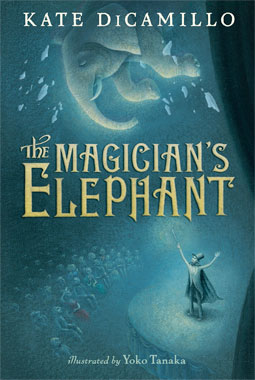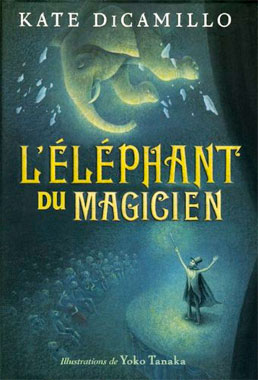

The Magician’s Elephant (2009)
Sorti le 7 septembre 2009 chez Walker Books UK,
Sorti le 8 septembre 2009 chez Candlewick Press US.
Traduit en français par Sidonie Van den Dries le 11 avril 2010 chez Scholastic FR / Tourbillon FR.
Adapté en dessin animé en 2023 sur NETFLIX INT/FR.
De Kate DiCamillo, illustré par Yoko Tanaka.
Pour adultes et adolescents.
(Fantasy urbaine, magie, presse) Peter Augustus Duchêne se pose beaucoup de questions, mais il y en a une dont il aimerait le plus avoir la réponse : Sa sœur est-elle encore en vie ? Et si oui, comment la retrouver ? La réponse que lui donne la diseuse de bonne aventure sur la place du marché de la ville de Baltese est de celle qu'il devra apprendre à croire : « Un éléphant ! Un éléphant le conduira là-bas ! »
*
Le texte original de Kate DiCamillo de 2009, illustré par Yoko Tanaka pour Walker Books UK et Candlewick Press US.
Chapter One
At the end of the century before last, in the market square of the city of Baltese, there stood a boy with a hat on his head and a coin in his hand. The boy’s name was Peter Augustus Duchene, and the coin that he held did not belong to him but was instead the property of his guardian, an old soldier named Vilna Lutz, who had sent the boy to the market for fish and bread.
That day in the market square, in the midst of the entirely unremarkable and absolutly ordinary stalls of the fishmongers and cloth merchants and bakers and silversmiths, there had appeared, without warning or fanfare, the red tent of a fortuneteller. Attached to the fortuneteller’s tent was a piece of paper, and penned upon the paper in a cramped but unapologetic hand were these words: The most profond and difficult questions that could possibly be posed by the human mind or heart will be answered for the price of one florit.
Pater read the small sign once, and then again. The audacity of the words, their dizzying promise, made it difficult, suddenly, for him to breathe. He looked down at the coin, the single florit, in his hand.
“But I cannot do it,” he said to himself.” Truly, I cannot; for if I do, Vilna Lutz will ask where the money has gone and I will have to lie, and it is a very dishonorable thing to lie.”
He put the coin in his pocket. He took the soldier’s hat off his head and then put it back on. He stepped away from the sign and came back to it and stood considering, again, the outrageous and wonderful words.
“But I must know,” he said at last. He took the florit from his pocket. “I want to know the truth. And so I will do it. But I will not lie about it, and in that way, I will remain at least partly honorable.” With this words, Peter stepped into the tent and handed the fortuneteller the coin.
*
La traduction française au plus proche.
Chapitre Un
À la fin du siècle dernier, sur la place du marché de la ville de Baltese, se tenait un garçon avec un chapeau sur la tête et une pièce de monnaie dans la main. Ce garçon s'appelait Pierre Auguste Duchêne et la pièce qu'il tenait ne lui appartenait pas, mais était la propriété de son tuteur, un vieux soldat nommé Vilna Lutz, qui l'avait envoyé au marché pour acheter du poisson et du pain.
Ce jour-là, sur la place du marché, au milieu des étals tout à fait banals des poissonniers, des marchands de tissus, des boulangers et des orfèvres, était apparue, sans avertissement ni fanfare, la tente rouge d'une diseuse de bonne aventure. Attachée à la tente de la diseuse de bonne aventure, une feuille de papier sur laquelle étaient inscrits, d'une main serrée mais sans complaisance, ces mots : Les questions les plus profondes et les plus difficiles que l'on puisse se poser sont les suivantes Les questions les plus profondes et les plus difficiles que puisse se poser l'esprit ou le cœur humain trouveront une réponse pour le prix d'un florit.
Pater lut le petit écriteau une fois, puis une autre. L'audace des mots, leur promesse vertigineuse, lui rendit soudain la respiration difficile. Il baissa les yeux sur la pièce, l'unique florit, qu'il tenait dans sa main. "Mais je ne peux pas le faire, se dit-il. Vraiment, je ne peux pas, car si je le fais, Vilna Lutz demandera où est passé l'argent et je serai obligé de mentir, et c'est une chose très déshonorante que de mentir."
Il mit la pièce dans sa poche. Il enlève le chapeau de soldat de sa tête et le remet. Il s'éloigna de la pancarte, revint vers elle et resta à considérer, une fois de plus, les mots scandaleux et merveilleux. "Mais il faut que je sache", dit-il enfin. Il sortit le fleuron de sa poche. "Je veux connaître la vérité. C'est ce que je vais faire. Mais je ne mentirai pas, et ainsi, je resterai au moins en partie honorable." Sur ces mots, Pierre entra dans la tente et tendit la pièce à la voyante.
*
La traduction française de Sidonie Van den Dries de 2010 pour TOURBILLON FR.
(à venir)
***

